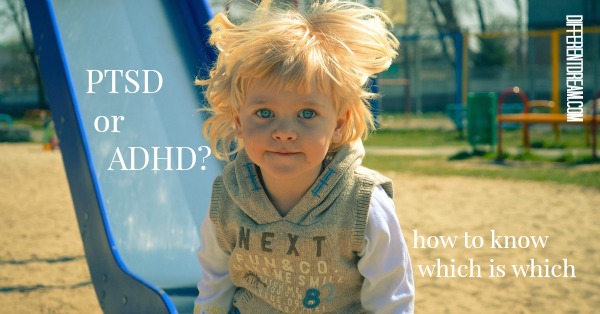When PTSD in Children Is Misdiagnosed as ADHD

Did you know that post-traumatic stress disorder (PTSD) is often misdiagnosed in kids as attention deficit hyperactivity disorder (ADHD)? Guest blogger and ABA therapist, Ruth Stieff, explains how’s she’s learned to determine the difference between ADHD and PTSD in children in this post.
“You mean it’s not ADHD?” This is a comment that is heard around the disability and social service community everyday. If you have a child that has been diagnosed with ADHD and nothing is working, maybe, you need to look a little further. You may ask, “How do I know if it will take longer with the current treatment plan or is it the wrong diagnosis?” Great question and there are a few red flags to look for when little or no progress is seen.
- Is the work the therapist is doing with your child making any difference? This assumes that you are pursuing treatment and following through with the therapist’s counsel at home. If you have not sought out therapy for ADHD, that is where to start.
- The quantity of pharmaceuticals your child takes is rising. A prescription will not solve all the issues. Individual and family therapy is needed. The strategies that aid a person with ADHD or other diagnosis must be learned and practiced.
- A therapist adds more diagnoses for your child. When I see a child diagnosed with ADHD with autism tendencies, Oppositional Defiant Disorder, General Anxiety Disorder or other similar disorders, I begin asking questions. I remember a conversation with parents who had a child who had a long list of diagnosis and was taking large doses of medications, “Do you feel this is really the issue?” Their answer was “No.”
With that child, I began asking questions related to life experiences. I was looking for clues of trauma. PTSD in children is a complex issue. What questions need to be asked?
- Pre birth trauma. This could be physical or emotional. If the child is adopted, you may have little knowledge of this. Was the child exposed to substance abuse in-vitro?
- Birth trauma. Once again, it could be physical or emotional. This would include a life-threatening circumstance in the first hours/days after birth. This includes being away from the mother for tests or in intensive care. Pain associated with this can cause trauma. If the child was taken from the mother and placed in the hands of an orphanage, a foster care home, or the adopting family, there are many traumatic and attachment issues associated with this.
- Trauma in the early years. This could come in many forms. Neglect, abuse, medical procedures, multiple placements with family or in foster care, divorce, death of a significant person in the child’s life.
- Trauma in elementary or later can include any of the above that happen during this time or things unresolved from earlier times.
If your child does not respond to cognitive behavior therapy or anything based on applied behavioral analysis, look at possible trauma or attachment issues. Many attachment and trauma difficulties mirror symptoms of ADHD or high functioning autism. The difference is that the strategies used in these neurological diagnoses don’t usually work if trauma is the underlying problem. Most schools use an approach that rewards good behavior and looks for motivators to do it. This may have a small amount of success but normally is short-lived. Once you have a trauma diagnosis and begin to use more helpful strategies, you will play a new role advocating for trauma based approaches at school.
In this scenario you might say, of course it’s not ADHD. Hopefully, it doesn’t take a long time down this road to figure out that your child has issues different than ADHD! It is a complicated journey but parents know this child better than anyone else so they can often know when the diagnosis is not quite a fit. That’s why there is no advocate like a loving and determined parent!
Your Questions about ADHD and PTSD in Children?
Has this post stirred up questions about your child’s special needs diagnosis? Feel free to leave them, so Ruth can answer them.
Do you like what you see at DifferentDream.com? You can receive more great content by subscribing to the quarterly Different Dream newsletter and signing up for the daily RSS feed delivered to your email inbox. You can sign up for the first in the pop up box and the second at the bottom of this page.
By Ruth Stieff
Ruth Stieff is a wife, mother and owner of One Piece LLC . She is passionate about helping children with learning differences make progress and helping parents normalize family life.
16 Comments
Submit a Comment
Subscribe for Updates from Jolene
Related Posts
How Do I Let Go of My Adult EA/TEF Child?
Valeria Conshafter explores the question “How do I let go of my adult EA/TEF child?” for EA/TEF Awareness Month.
The Physical Manifestations of Grief in Caregivers
Jolene explains how the heaviness of loss and sorrow can contribute to the physical manifestations of grief in caregivers.
Experiencing Post-Traumatic Growth while Raising a Child with Disabilities
Jolene explains the benefits of experiencing post-traumatic growth while raising a child with disabilities.






Heather, a new body of thought in the mental health community views RAD as the manifestation of severe trauma in very young children. More information about that is available in my book Does My Child Have PTSD? Here’s the link to the book on Amazon:https://www.amazon.com/dp/1942934017?tag=diffedream-20. Jolene
Our adopted daughter came from an abusive and neglectful family. She was also shuffled from one relative, friend, or babysitter to another to be babysat/live. The biological mother would leave and not be seen for days, weeks, or months. The biological father unknown. We adopted her soon after she turned 4. At that time she made an outcry of sexual abuse. She is now 13. Since age 4 she has been diagnosed with ADHD, Anxiety, Depression, PTSD, Oppositional Defiance Disorder (ODD), Reactive Attachment Disorder (RAD) and Disinhibited Social Engagement Disorder (DSED). AND an Eating Disorder. Not eating enough. After years of counseling and many ADHD medication trials her behavior and decision making in a lot of areas has not improved. There was no mention in your article of Reactive Attachment Disorder, which can present in some ways like ADHD. In our case, you find the child over the years continues to challenge EVERYTHING and you wonder why are they not following your instructions, or rules. Of course, there is more to that diagnosis, but I think it’s a shame to not present it, so people can research and ask questions regarding RAD/DSED.
Liz, your granddaughter is blessed to have a wise woman like you as her grandma. You did all the right things, and you are absolutely correct. The sooner a trauma is treated after it occurs, the less likely PTSD is to develop and the better the outcome. Jolene
I believe catching PTSD early is so important to helping a child through it. When it isn’t recognized, it can take on more severe and misunderstood reactions that don’t seem logical.
My granddaughter went to a cabin one weekend and while helping with our dog getting a fish hook in his leg, she suffered multiple wasp stings. She started to show signs of PTSD. It took convincing her parents first, who just dismissed her reactions to things like any bug in the house (a fly, gnat, mosquito), dust floats in the sunshine (flitting around by her) , an unknown “fuzz” seen somewhere, not wanting to plant flowers (they attract bees) , keeping doors and windows closed (bees might get through the screens), as not a big deal. She didn’t want to go places or be outside much after either.
Her reactions were getting worse and more histerical, before I was really able to start to help her deal with it. I was finally able to explain to the parents that these were signs she had been traumatized by the incident. It took a long time, but she is doing so much better. She and her sister had a lemonade stand last week. Some yellow jackets started to fly under the table. She was able to calmly get up, go sit by her mom, and watch me remove the empty cups attracting them. She was even willing to sit at the table again afterwards. She was concerned still, but was able to breathe and think and control her emotions.
I have seen a number of children that have been diagnosed with autism but also have a trauma background. Applied behavioral analysis (ABA) is a behavioral therapy that is often used effectively with individuals with autism. If the child does not respond well to ABA strategies (which most school use) then it is wise to look at trauma. If a child has behaviors that resemble autism but is not helped by ABA (or it’s a disaster), I have found trauma is often the reason for these behaviors.
Autism was mentioned twice. How would you differentiate between Autism and PTSD?
Tricia, That’s a hard one. If at all possible, stick with your guns. Ask the therapist to go with you for a meeting with the foster care agency or at least have him/her write a letter. Jolene
Our 6 year old foster daughter has been diagnosed with PTSD and is in therapy for it. But our foster family agency continues to push for a diagnoses and treatment of ADHD because of things her teacher has said. We do NOT want to medicate a 6 year old or have special allowances made in school because she gets bored and would rather play. Everyone knows she has PTSD and the therapist that is treating her for that isn’t concerned about ADHD. But they keep pushing. It’s so frustrating.
You’re very welcome! It’s certainly something to look into. Best wishes! Jolene
My daughter has been diagnosed with ADHD, bipolar and ODD. She is on several meds including one for sleep. Makes me wonder now if it isn’t PTSD. Thanks for the read, I will be looking into this.
I encourage you to get two books. One is called Trauma-Proofing Your Kids by Levine and Kline (http://www.amazon.com/gp/product/1556436998/ref=as_li_tl?ie=UTF8&camp=1789&creative=390957&creativeASIN=1556436998&linkCode=as2&tag=diffedream-20&linkId=DK2N4T65BQARFVWZ). The other is my book, Does My Child Have PTSD? (http://www.amazon.com/gp/product/1942934017/ref=as_li_tl?ie=UTF8&camp=1789&creative=390957&creativeASIN=1942934017&linkCode=as2&tag=diffedream-20&linkId=A4Q2ABB6QWJFBNMN). Both have ideas of exercises to do with young children to help them process trauma. However, when your little one is able to talk (age 3 or older), if traumatic events continue or trauma symptoms present or persist, you would be wise to seek therapy. My book has a chapter about different therapies and how to find therapists. You’ll also find some information in other posts in this series.
Hi Louise, thank you for your comment. I don’t think the author meant to imply that parents should first try an ADHD diagnosis and then move on to trauma treatment if that isn’t successful. She is speaking from years of experience working with kids with special needs. Very often her clients come to her diagnosed with ADHD, a common diagnosis. The doctors and parents haven’t heard of PTSD in kids. Ruth is trying raise awareness that in those situations, parents should ask about trauma and PTSD diagnosis and treatment. Jolene
This article seems to suggest that you should first attempt ADHD treatments and only if that doesn’t work should you consider treatment for trauma. One would hope that parents would read up and have an understanding if their child has gone through trauma and then find a therapist experienced in trauma who would be able to diagnose if adhd is that is also an issue.
Our 16 month old is both adopted and a heart patient. We already see things I feel are stress and trauma related. How can we help her cope better now and will that potentially help her down the line?
Your observation in 2001 was very astute. The recognition of PTSD in kids rather than ADHD is growing, but there’s a long way to go until most kids get the treatment they need.
When I was in AmeriCorps I worked at a child care center that was mostly for preschoolers in the foster care system. Almost all of them were diagnosed with ADHD and were heavily medicated. I used to think to myself that their behavior probably had less to do with ADHD, and more to do with the horrible things they’d witnessed and experienced that led to them being in foster care, and their foster experience itself as they were frequently bounced around, separated from their siblings, punished in weird ways, etc. This was back in 2001. I hope by now children like them are being recognized as probably having PTSD, and are getting help with processing the trauma they’ve been through, instead of just being given meds!